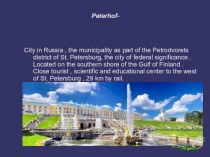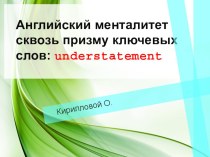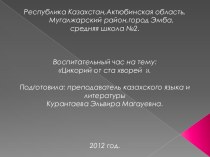- Главная
- Разное
- Бизнес и предпринимательство
- Образование
- Развлечения
- Государство
- Спорт
- Графика
- Культурология
- Еда и кулинария
- Лингвистика
- Религиоведение
- Черчение
- Физкультура
- ИЗО
- Психология
- Социология
- Английский язык
- Астрономия
- Алгебра
- Биология
- География
- Геометрия
- Детские презентации
- Информатика
- История
- Литература
- Маркетинг
- Математика
- Медицина
- Менеджмент
- Музыка
- МХК
- Немецкий язык
- ОБЖ
- Обществознание
- Окружающий мир
- Педагогика
- Русский язык
- Технология
- Физика
- Философия
- Химия
- Шаблоны, картинки для презентаций
- Экология
- Экономика
- Юриспруденция
Что такое findslide.org?
FindSlide.org - это сайт презентаций, докладов, шаблонов в формате PowerPoint.
Обратная связь
Email: Нажмите что бы посмотреть
Презентация на тему к исследовательской работе по английскому языку English borrowings in the speech of the students of Lyceum №3
Содержание
- 2. The topicality of the research was
- 3. The aims of our project work are:
- 4. The achievement of these aims involves the
- 5. The novelty of the research lies in
- 6. Hypothesis: English borrowings have an impact
- 7. Subject: investigation of the sources of borrowing
- 8. The methods of our research are
- 9. «A borrowed word or a borrowing
- 10. Why are there so many English loanwords
- 11. The influx of English borrowings into the
- 12. There are several factors contributing to the
- 13. The language ofadvertising is a new phenomenon in Russian.
- 14. The youth has a leading role in making new English borrowings popular
- 15. a) The lack of equivalent1.2. Linguistic
- 16. b) Differentiation of meanings:бургер(бутерброд)
- 17. c) Economy of expression: “борьба на руках” was replaced by the English “армрестлинг”.
- 18. d) The desire to be innovative creative-креативный tolerant-толерантный, expressive-экспрессивный exclusive-эксклюзивный
- 19. According to recent investigations loanwords are distributed
- 20. саммит, электорат, брифинг, импичмент, спичрайтер, инаугурация… Politicsбартер,
- 21. Computer World‘ньюс’ (news), ‘юзер’ (user), ‘гамер’ (gamer),
- 22. Everyday lifeгамбургер‘‘шузы’ (shoes)‘‘тостер’ (toaster)маркер’(marker)
- 24. Very often borrowings exceed an average percentage
- 25. The true writers and poets are sure
- 26. 2. The adaptation of English loanwords in
- 27. b) Phonological adaptation:
- 28. Free substitution: rap > реп /рэп
- 29. In this research, we also have intended
- 30. Practical Part(sociological research)
- 31. The results of the survey show
- 32. Figure 2.
- 34. Internet-35% media-26% friends-23% parents and teachers-16%Figure 4.
- 35. NO-80% Yes-12% Seldom-8%
- 37. Conclusion In the whole we can state
- 38. 3. Список использованной литературы: 1. Гальперин И.Р.
- 39. Скачать презентацию
- 40. Похожие презентации
The topicality of the research was caused by the wide use of English loanwords in the Russian speech of teenagers.
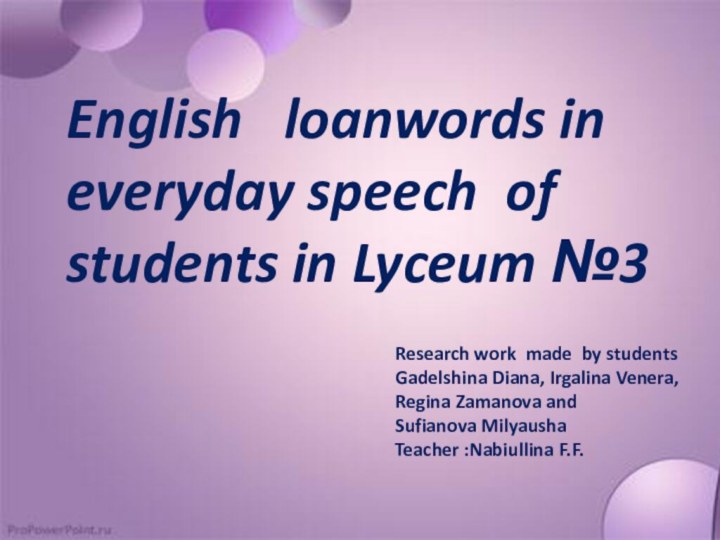










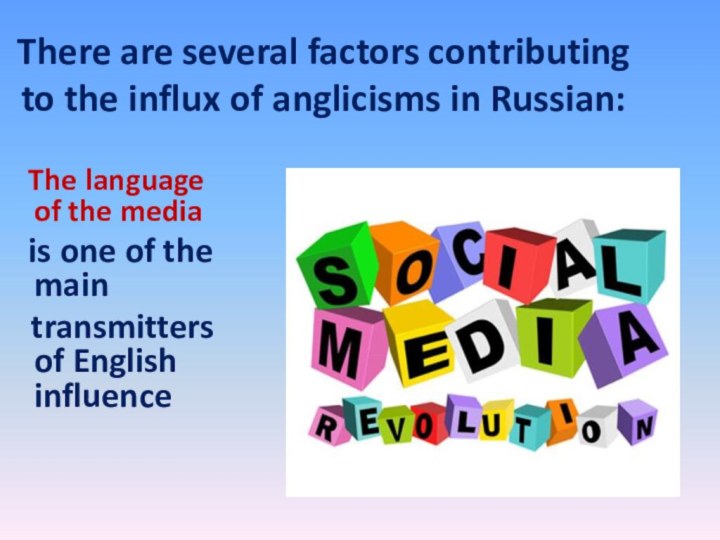








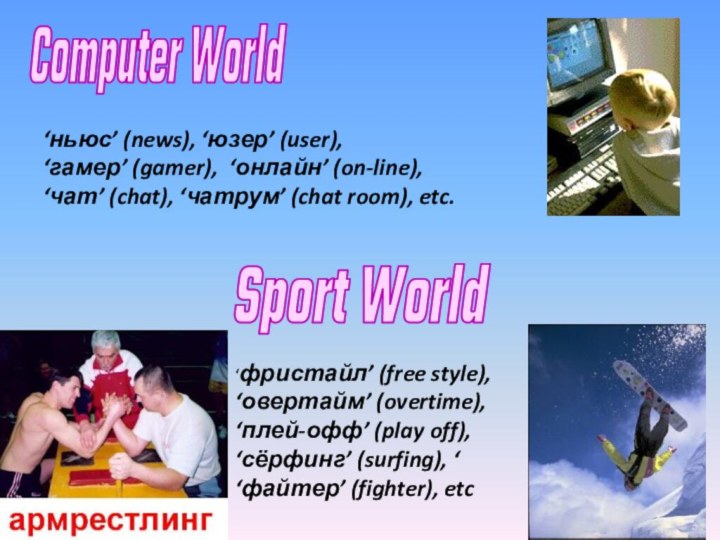






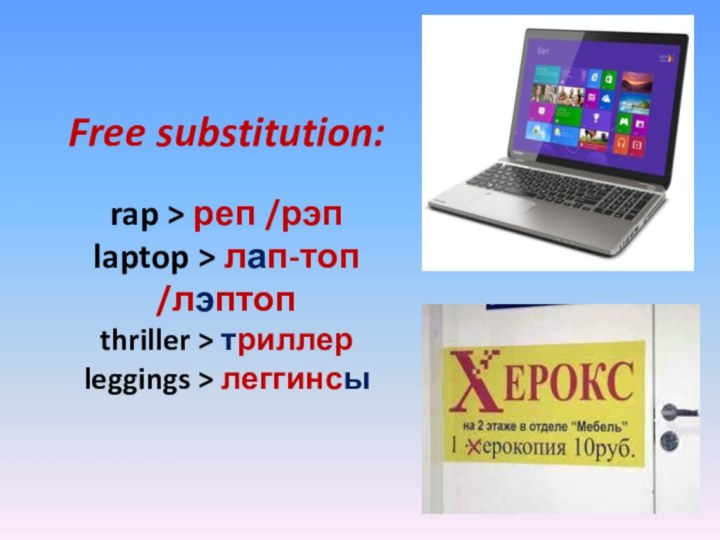


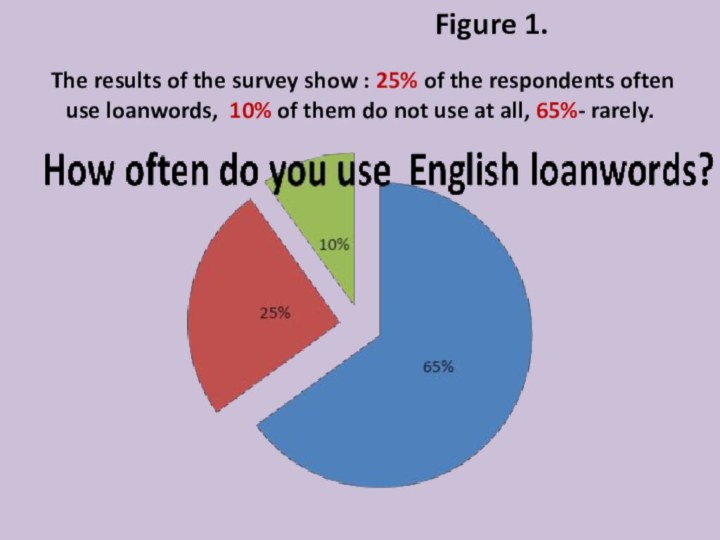

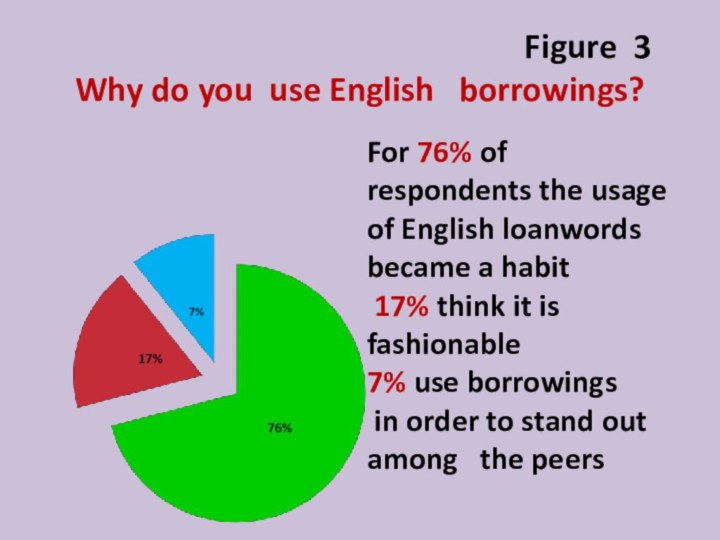






Слайд 3 The aims of our project work are: 1.
to analyze factors contributing to the influx of anglicisms
in Russian 2. to study the impact of loanwords on the speech of our schoolmatesСлайд 4 The achievement of these aims involves the following
tasks: -To determine the reasons
for borrowing -To find out the attitude of students to the phenomenon under investigationСлайд 5 The novelty of the research lies in the
fact that, we have examined the influence of loanwords
on the speech of students in a separate schoolСлайд 6 Hypothesis: English borrowings have an impact on the
cultural life and the linguistic behaviour of young people.
Слайд 7 Subject: investigation of the sources of borrowing and
the reasons for the use of English words in
everyday speech of our students. The object of the study: lexical units of English origin.Слайд 8 The methods of our research are analysis of
the theoretical material, newspapers ,advertisement,films ,
questionnaire survey
Слайд 9 «A borrowed word or a borrowing is a
word, a phrase or an idea that has been
copied by the speakers of one language from a different language…»Longman Dictionary
of Contemporary English
Слайд 10 Why are there so many English loanwords in the
modern Russian language? What affects the process of lexical
borrowing ? Why do teenagers prefer English loanwords to Russian words?
Слайд 11
The influx of English borrowings into the Russian
language has greatly accelerated in recent years as a
result of the fundamental political, social, economic, and cultural changes, as well transition to market economy .1. The social and linguistic background of borrowing :
Слайд 12 There are several factors contributing to the influx
of anglicisms in Russian:
The language of the
media is one of the main
transmitters of English influence
Слайд 15
a) The lack of equivalent
1.2. Linguistic motivations
for borrowing
The fate of new borrowings is usually determined
by linguistic factors:Слайд 18 d) The desire to be innovative creative-креативный tolerant-толерантный,
expressive-экспрессивный exclusive-эксклюзивный
Слайд 19 According to recent investigations loanwords are distributed in
the following way in different types of discourses:
in
fiction they comprise 6%,
in common communication their quantity is 9%,
in business discourse they make up 14%,
in scientific discourse-22%
in mass-media discourse they are the most numerous-30%
Слайд 20
саммит, электорат,
брифинг, импичмент,
спичрайтер,
инаугурация…
Politics
бартер, брокер,
ваучер, дилер,
дистрибьютер, инвестор…
Economics
Spheres of Using English Words in
Russian
Слайд 21
Computer World
‘ньюс’ (news), ‘юзер’ (user),
‘гамер’ (gamer), ‘онлайн’
(on-line),
‘чат’ (chat), ‘чатрум’ (chat room), etc.
Sport World
‘фристайл’ (free
style), ‘овертайм’ (overtime),
‘плей-офф’ (play off),
‘сёрфинг’ (surfing), ‘
‘файтер’ (fighter), etc
Слайд 24 Very often borrowings exceed an average percentage of
loanwords in mass-media discourse. The proof are the below
given lines from “The Arguments and Facts”«- А бонусы топ-менеджеров наших крупных госкорпораций в конце прошлого года доходили до нескольких миллионов долларов…»
Слайд 25 The true writers and poets are sure think
about the purity of the Russian language and
try not to use any borrowings in their works if there are Russian equivalentsСлайд 26 2. The adaptation of English loanwords in Russian
a) Orthographic adaptation : 1. transplantation : Panasonic
– Панасоник 2. transliteration: slogan > слоган, tabloid > таблоид, 3. transcription image [ˈɪmɪdʒ] - имидж, know-how [ˈnəʊhaʊ] -[ноу-хау]Слайд 27 b) Phonological adaptation: Substitution
without change:
decoder > декодер, remake > римейк jacuzzi > джакузи;tuning > тюнинг. Substitution based on similarity: fitness > фитнес casting > кастинг rafting >рафтинг jogging >джоггингСлайд 28 Free substitution: rap > реп /рэп laptop > лап-топ /лэптоп
thriller > триллер
leggings > леггинсы
Слайд 29 In this research, we also have intended to
carry out a study of English loanwords borrowed into the
speech of students of our school.Слайд 31 The results of the survey show :
25% of the respondents often use loanwords, 10% of
them do not use at all, 65%- rarely.Figure 1.
Слайд 33
Figure 3 Why do you use English borrowings?
For 76% of respondents the usage of English loanwords became a habit
17% think it is fashionable
7% use borrowings
in order to stand out among the peers
Слайд 37 Conclusion In the whole we can state that our
hypothesis has been proved. Our work has demonstrated borrowing
process from English into Russian is real in our life and we watch the intensive influence of English language on Russian one.











